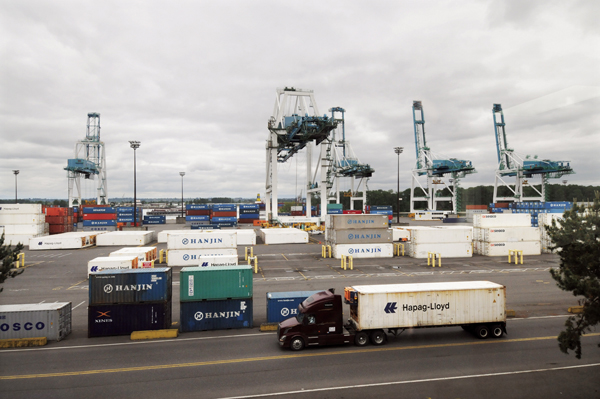forum
library
tutorial
contact

Filipino Firm to Manage Portland Port
by Nick BjorkDaily Journal of Commerce, May 11, 2010
|
the film forum library tutorial contact |

|
Filipino Firm to Manage Portland Portby Nick BjorkDaily Journal of Commerce, May 11, 2010 |
 The Port of Portland board of commissioners on Wednesday will vote whether to approve a proposed 25-year lease with International Container Terminal Services Inc., a Philippines-based port management company, to operate Terminal 6 at the Port of Portland. Terminal 6 is the port's container and break-bulk facility.
The Port of Portland board of commissioners on Wednesday will vote whether to approve a proposed 25-year lease with International Container Terminal Services Inc., a Philippines-based port management company, to operate Terminal 6 at the Port of Portland. Terminal 6 is the port's container and break-bulk facility.
ICTSI will pay the port $8 million initially and $4.5 million annually to operate the port's only container terminal. ICTSI also will pay additional incremental revenue to the port as terminal volume increases. The initial $8 million will go toward purchasing the operating equipment, but the port will retain ownership of the four cranes at the terminal. The lease also will add the 192 acres at Terminal 6 to the local, state and federal tax tolls.
The company will take over operating and marketing the terminal, while the port will continue to provide maintenance and security.
The local chapters of the International Longshore and Warehouse Union and the District Council of Trade Unions will continue to work at the terminal. The Port of Portland has operated the terminal since 1974.
"With ICTSI's access to private capital and international marketing capabilities, the lease is almost a no-brainer," said Josh Thomas, spokesperson for the Port of Portland.
ICTSI is the fourth largest international independent container terminal operator in the world. The family of Enrique K. Razon, the company's president, has managed ports for three generations. The company operates 18 terminals in 13 countries, including Australia, Poland, Japan and Brazil. The lease in Portland would mark the company's first terminal operation in the U.S. As part of the lease, ICTSI has agreed not to operate another port on the West Coast.
"The lease is written so that we have assurance that no cargo will be diverted from Portland because the company can't operate another port on the West Coast," he said. "I think it is a great vote of confidence for Portland's future that this company has chosen Portland as its access point to expand into the United States."
While this lease would mark ICTSI's first expansion into the U.S., foreign carrier and terminal operating companies routinely operate at U.S. container ports under long-term leases. Approximately 70 percent of all West Coast terminals involve companies based outside the U.S.
Aaron Ellis, communications director for the American Association of Port Authorities, said there is a growing trend of public-private partnerships in the operation of U.S. seaports. In this economy, securing public money to finance multimillion-dollar endeavors is difficult, he said.
"It's really a win-win for ports and the surrounding communities because it guarantees consistent revenue for the port while taking away the risk factor and putting it in the private sector," Ellis said. "Although these leases also take away the potential big rewards, they safeguard the public sector from potential losses in the volatile shipping industry."
Also, companies that operate terminals independently can grow business on an international level more easily than can a regional governing body, according to David Miller, managing director for Public Financial Management Inc., a Philadelphia-based financial services firm that deals exclusively with government clientele.
"There is a synergy of sorts between these international terminal operators and international shipping lines," Miller said. "These independent companies can get better pricing and work out more efficient shipping lines."
Miller noted that ports are becoming more willing to sign longer leases than in the past. The private sector is more willing to invest in infrastructure and improvements because they are guaranteed to operate there for a longer period of time, he said.
"If you only have a 10-year lease, no private company is going to go out and purchase new equipment or work towards long-term contracts with shipping lines," he said. "I think that there is a great benefit to both the private and public sector with these partnerships."
learn more on topics covered in the film
see the video
read the script
learn the songs
discussion forum
